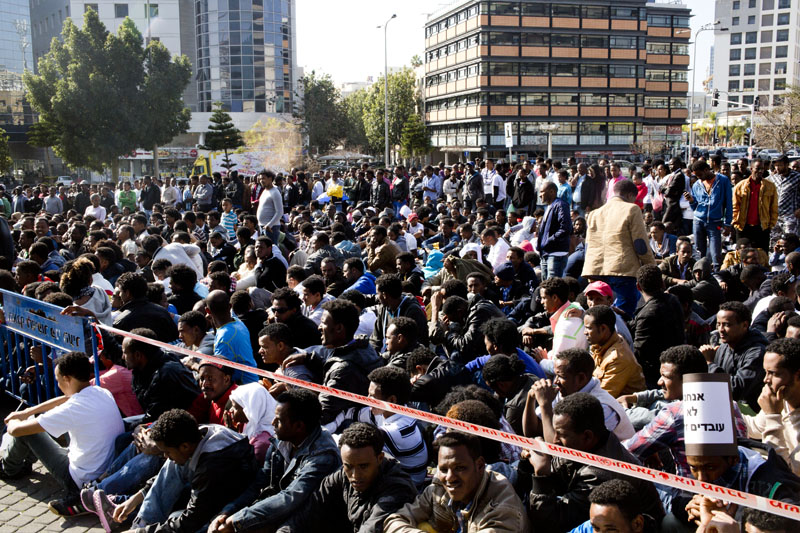African asylum seekers are holding their second of a three-day national protest. On Monday, thousands of asylum seekers, most of whom are employed by hotels and restaurants, went on strike and held large rallies in front of Western and African embassies.
The protesters are calling on the international community to make sure Israel respects its commitments under the UN Convention relating to the Status of Refugees, thus ensuring that the Israeli government ceases rounding up and imprisoning asylum seekers without trial, and that it releases inmates already held under the revised anti-infiltration bill.
In a press release sent on Sunday , the protest organizers wrote:
We turn to the ambassadors and the diplomats in Israel with a desperate call for help. We know that your countries are dealing with the challenge of many refugees arriving at your gates… many of our own brothers and sisters have arrived at your countries and have received protection, shelter and refugee status.
We recognize the difficulty in accepting refugees and hosting foreigners. It’s never easy to let a stranger into your home… yet we see that the treatment of refugees in many countries is much better than the humiliation and harsh treatment we suffer in Israel […] the government of Israel sees in us a threat that needs to quickly be rid, it arrests us in the streets as if we were criminals, it locks us indefinitely, it leaves us in the margins of society without access to basic rights and it incites against us again and again…”
There are some 53,000 African asylum seekers in Israel. The vast majority of them arrived on foot from Eritrea and Sudan to flee civil wars and persecution by the Eritrean dictatorship. The asylum seekers settled in Israel’s poorest neighborhoods; at least half of the community lives in South Tel Aviv, while the others mostly live in Arad and Eilat (due to employment opportunities provided by the tourism business in those cities).
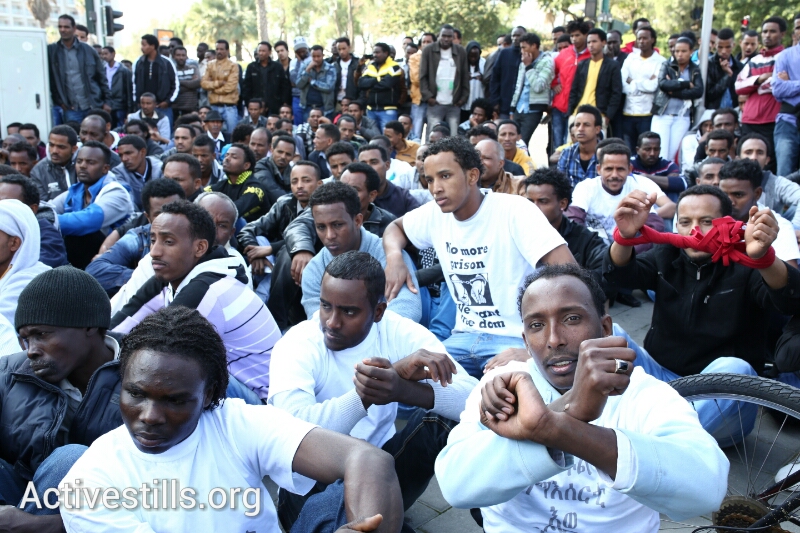
The previous Netanyahu government made it its goal to stop the influx of asylum seekers into Israel. While recognizing that it could not deport most of them, the government refused to review their requests to be recognized as refugees. Israel then installed a fence along its southern borders, and according to some reports, several IDF units even conducted raids on the Sinai Peninsula in order to turn back convoys of refugees. Many of those who already entered Israel were subjected to the original anti-infiltration bill, which allowed the government to lock up anyone who entered the county illegally without trial for three years, and in some cases, indefinitely.
It is worth noting that this policy is aimed only at the African community, despite the fact that the number of non-African illegal immigrants in Israel – most of them from former Soviet counties – is almost double that of African asylum seekers (Hebrew). Most of the post-Soviet immigrants do not face threats to their lives in their country of origin.
The government also tried to negotiate a deal with other African counties, which would agree to receive the asylum seeker community in exchange for Israeli financial aid, and perhaps other benefits or goods. So far these efforts have not succeeded.
Click here for +972 Magazine’s full coverage of asylum seekers in Israel
The amendment to the anti-infiltration law was struck down by the High Court of Justice several months ago. Last month, the Knesset passed a new bill which allowed for authorities to imprison asylum seekers for a year. At the same time, the police increased the raids on Africans, while municipalities, including Tel Aviv’s, took harsher measures against businesses owned by asylum seekers, shutting down most of them.
Nearly the entire African community is taking part in the protest. Asylum seekers held several large marches in Tel Aviv, and at least 20,000 people took part in a huge rally at Rabin Square on Sunday. Last month, dozens of asylum seekers walked out of the Holot holding facility in the south, before they were apprehended and sent back by the police. Eritrean dissidents also broke into and disrupted a talk by the Eritrean ambassador in a kibbutz in Israel’s north.
In response to the strike, Israeli officials called for harsh measures against the asylum seekers. Interior Minister Gidon Sa’ar (Likud) warned that the protest might turn violent, and stated that the asylum seekers “are not refugees.” Prime Minister Netanyahu wrote the following message on his Facebook page:
Protests and strikes won’t help. We’ve completely curbed infiltration into Israel and now we are [steadfast in our determination] to remove the illegal work infiltrators who have entered Israel. Last year we increased six-fold — to more than 2,600 – the number of infiltrators who left, and the goal this year is to increase that number even more.
The general strike and protest events are due to continue tomorrow.
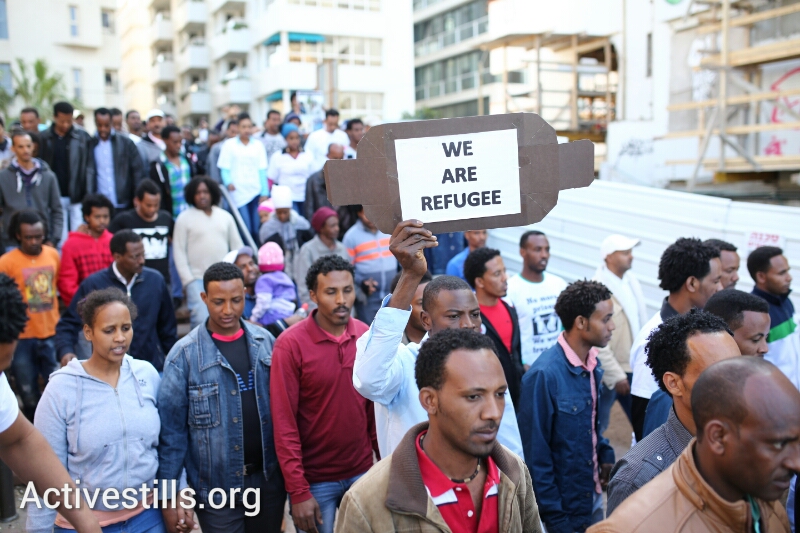
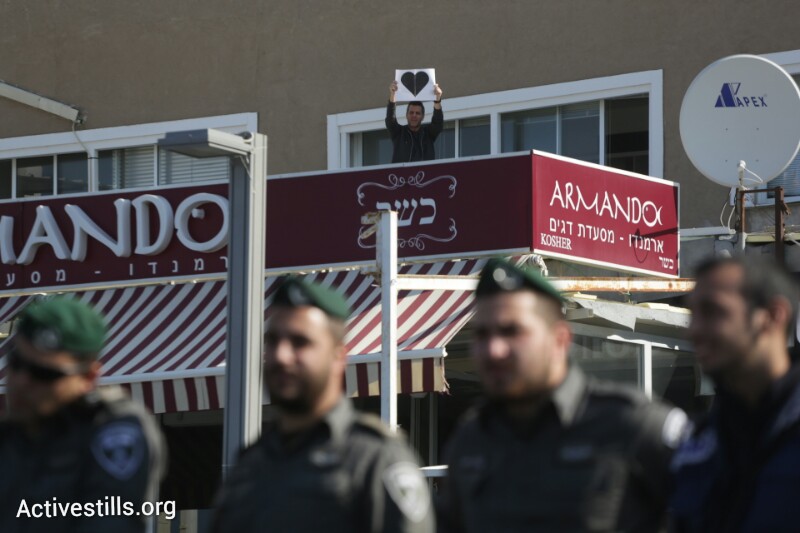

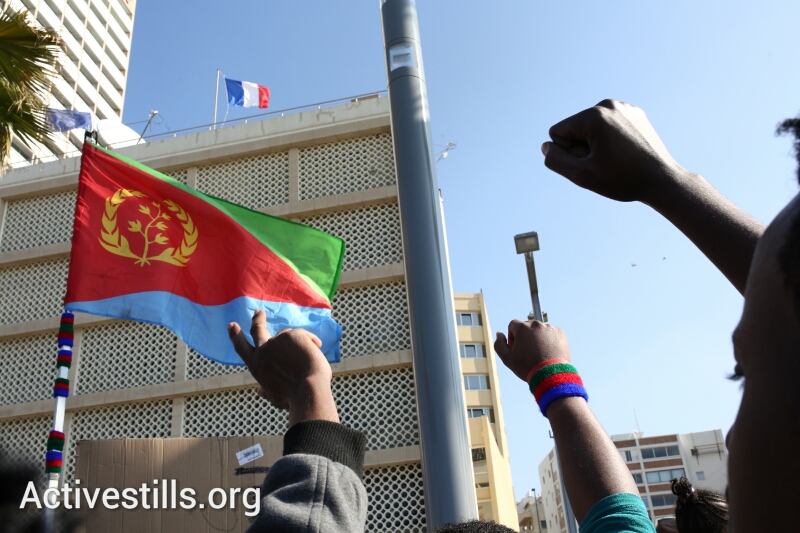
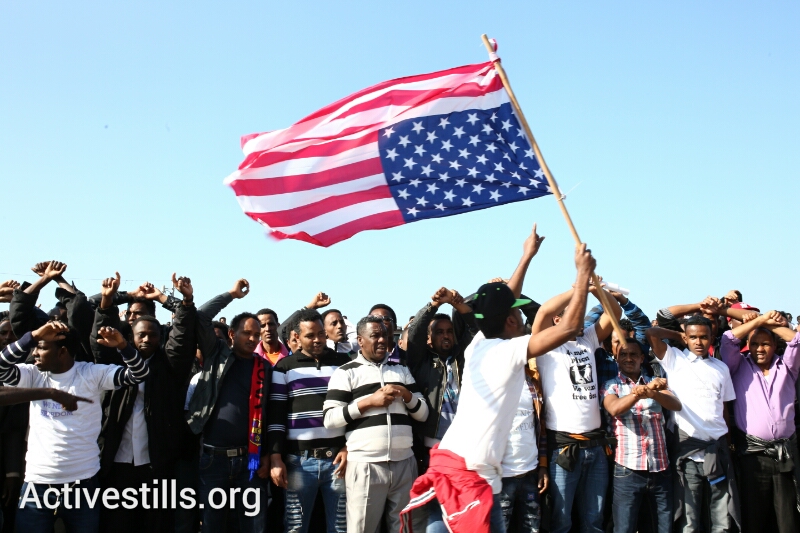
Related:
African asylum seekers strike to demand rights, hold unprecedented rally in Tel Aviv
Prison break: African asylum seekers claim their place on the Israeli political map
Knesset passes revised law for detention of African asylum seekers


